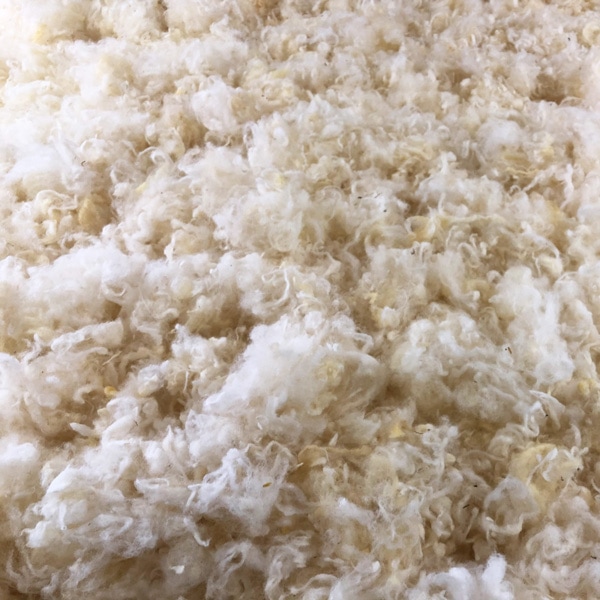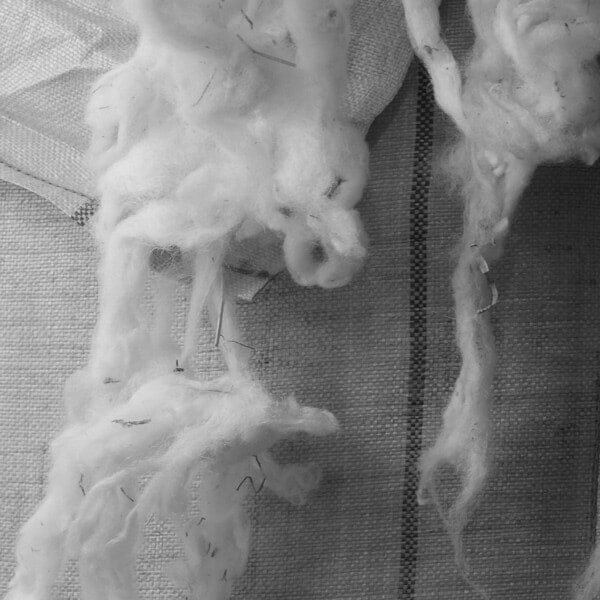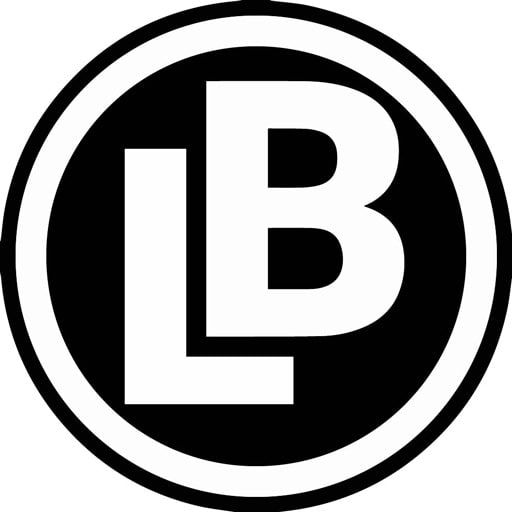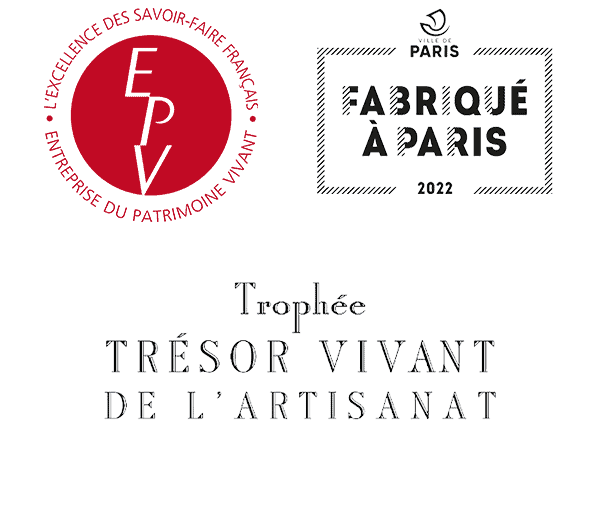Wool is the starting point for ever more comfortable sleep.
Wool is intrinsically linked to our craft, our know-how and our products. It’s an obvious choice when it comes to bedding, as it objectively has many advantages. natural technical features for even more comfortable sleep.
We use lots of natural materials to fill our box springs and mattresses. But there is one that stands out: wool.
This fiber is the main filling of our mattresses. Although it’s considered agricultural waste, we’ve been recycling it for over 100 years.
Our mattresses are made (for the most part) from 100% pure, untreated local virgin wool:
- The benefits of wool to help you sleep peacefully
- The breed of sheep we used
- Where the wool comes from
- Respect for animal welfare
- Wool traitment
- Good for the planet
Without it, we are nothing.
That’s why we’d like to highlight it here and tell you more about our wools, as many of you have asked us to do.
A performance material for a ultimate sleeping experience
The objective virtues of wool benefit the comfort of the wool mattress.
Pure wool helps to naturally ensure a good bed climate.
The benefits of wool help both young and old sleep better.
It was for all these qualities that wool was first used in mattresses.
And what if innovation in bedding also meant relying on the maturity of a traditional technology that has proved its worth over time.
Discover the benefits of wool for sleep.
The Texel breed
It’s the ideal fiber for our mattresses.
Not all wools are created equal when it comes to beeding aming at the best possible sleep.
We use full-fleece virgin wool from a very special breed of sheep: the Texel.
Texel breed is springy and plump for optimum sleeping comfort.
Find out more about Texel wool.

Sourcing locally
Wool is a local resource. The ones we use are mostly collected in central France.
While some manufacturers prefer long supply chains, we’ve focused on shortening ours.
Finally, we’ve been working closely with the same producers for years, creating the trust needed to guarantee the best wools to our customers.
Find out more about where wool comes from.

Respecting animal welfare
Wool is produced with respect for animal welfare, including the vital collection of wool by sheep that have to be shorn every year.
The wool grows again and again on the sheep’s backs, in a natural cycle.
We work with breeders and shearers who exclude all parasite treatments from their extraction processes.
This feature helps make wool mattresses eco-responsible.
Shearing sheep does not cause the animal any suffering; on the contrary, it is necessary for its vital balance.
The shearing process itself is carried out by skilled professionals with no industrial logic, to ensure the utmost respect for the animal’s comfort.
Find out more about ethical wool production.
A natural, eco-friendly fiber
Handcrafter with care for our planet
Beyond its virtues for an optimal sleeping experience, wool is a fiber with a low impact on the environment.
Discover the benefits of wool for the planet.
And it is undoubtedly the most eco-friendly fiber of all time for the following reasons:
- This fiber (re)grows naturally on the sheep’s back.
- No chemical treatment is involved in the manufacturing or transformation process.
- It is produced locally, limiting the movement of material to a minimum, using far less energy than the production of artificial fibres.
- It can be recycled and is biodegradable, releasing nitrogen rich nutrients when used as compost.
Our work also involves respecting the natural and ecological qualities of wool, in harmony with nature.
With wool at the heart of the product, we want to recreate the link between Nature, materials and know-how.
Other considerations surrounding our wool
Traceability
Wool is part of a traceable process.
The entire wool manufacturing process is traceable. Each batch of wool is identified at the time of collection.
Each wool ball is associated with the following information:
- breeder’s name
- wool quality (breed, fiber length)
- ball weight
Organic certifications
Is our wool certified organic? Many of you have asked us about this.
Here are a few explanations.
Our wool is not certified organic, mainly because of the cost of certification, even though wool is essentially a natural, ecological fiber.
Find the error!
We made this choice to achieve a balance that makes sense between :
- environmental impact
- the price/quality ratio of our raw materials
- the positive social and societal impact on our territories
And this at the expense of formal wool certification.
Nor does this mean that we are against labels.
In fact, we’ve been awarded a number of labels. We do our best!
About wool labelling
AB wool cannot exist on a formal level.
The European BIO AB mark only applies to agricultural products.
But wool is not considered an agricultural product, but an agricultural waste.
Even if a sheep farm has the AB label, it’s for meat or milk or both, but not for wool.
Let’s keep ourselves informed.
Traitement
Before we use it, the wools we use are washed in Belgium.
No chemical or industrial processes are required for the treatment of sheep’s wool.
After shearing, collection and sorting, it is simply washed with biodegradable soap and degreased in a soda bath (sodium carbonate).
Follow with a massive rinse, then drying.
We carefully select wool from farms that meet strict quality, environmental and animal welfare standards.
We’ve been working with the same suppliers for a long time.
Wool mattress manufacturer Les ateliers Le Briand tells us more about wool production.
Even though some mattress manufacturers claim that wool is unprocessed, it is washed at the very least to ensure that a wool mattress is made in the best possible way.
The carding operation is carried out in situ at the Le Briand workshops in Paris.
If you’d like to find out more about this noble natural fiber, we invite you to read our complete guide to wool.
The locality
We believe in the virtuous circle of adding value to a locally-produced resource on a local scale.
Discover the benefits of wool for the economy.
The more outlets there are on a national scale (the more supply there is on a national scale for wool), the less need there is to export wool production that hasn’t found a buyer to do something with it.
The more demand there is locally for wool products, the more likely it is that we’ll see the creation of long-term relays whose aim is to transform this extraordinary fiber.
All of this is conducive to the economic and social vitality of our region.
Let’s fight the negative trend whereby many raw materials produced in France are exported for lack of domestic or European outlets, as is the case with wool.
80% of French wool is shipped to China, only to return to us in the form of garments manufactured under disastrous ecological conditions and with no traceability.
Let’s reverse this trend! The wool we produce in France must be recycled in France.
And you’ve guessed it: the more of us opt for wool-based products like the wool mattress, the better.

